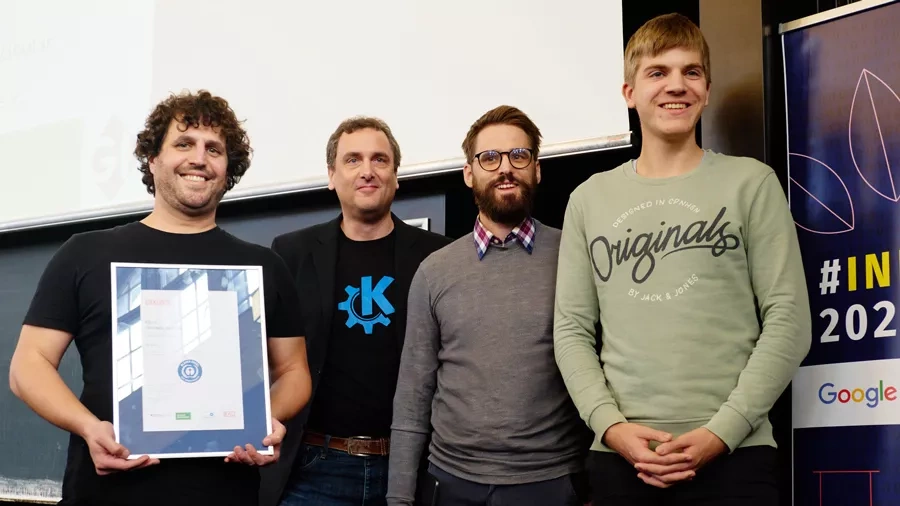The first message that Leonard Kleinrock and his student Charley Kline wanted to send to a computer located 500 km away at the Stanford Research Institute in 1969 was the word LOGIN. However, the connection crashed after just the first two letters and this is why the first message sent on the internet, which was still known back then as ARPANET, ended up being “LO” and not “LOGIN”. The researchers could never have foreseen at the time that their invention would impact almost all aspects of human life 53 years later. It is thus no wonder that they never considered the huge amount of energy consumed by the internet or its resulting impact on the environment.
Data centers – the backbone of digitalisation and secret energy guzzlers
The fact that the internet consumes so much energy is primarily due to its underlying technology. Everything we do on the internet – from writing an e-mail and online banking through to streaming videos – has to be processed in data centrers. They are thus considered the backbone of digitalisation. In order to operate one single data center, however, it requires as much energy as an entire town in some cases. Yet it is not just their high consumption of energy that makes data centers problematic from an environmental point of view. Data centers also have to be cooled to ensure that they don’t overheat and many operators use coolants that are damaging to the environment. The Blue Angel focuses on both of these issues. In its Basic Award Criteria for ENERGY EFFICIENT DATA CENTER OPERATION (DE-UZ-161) and CLIMATE FRIENDLY COLOCATION DATA CENTERS (DE-UZ 214), the ecolabel not only imposes strict requirements on energy consumption but also on air conditioning and the use of technology.
Sustainable servers and data storage devices are essential for the environmentally friendly operation of data centers
It is not just the data center itself that needs to be operated in a more environmentally friendly way but also the technology that is installed in it. Servers are the main consumers of energy in data centers. In order to reduce the carbon footprint of data centers, it is thus vital to install servers that work economically. Saving energy in the operation of servers and data storage products pays off twice in the data center: On the one hand, there are the direct energy savings achieved by the devices themselves and, on the other hand, there is a reduced demand for cooling.
The Blue Angel environmental label for SERVERS AND DATA STORAGE PRODUCTS (DE-UZ 213) sets high minimum requirements for the energy efficiency of servers, data storage products and power supply units, as well as for the elimination of pollutants in the plastic materials used in the products. The Blue Angel can thus be used to label devices that stand out due to their high energy efficiency, long service life and avoidance of environmentally polluting materials.
THOMAS-KRENN.AG is the first licence holder of the Blue Angel ecolabel in this product group. The company based in Freyung in the Bavarian Forest has been manufacturing servers and storage systems in accordance with the built-to-order principle since 2002. The ceremony to present the certificate will be held on 9 November 2022 at the 10th Specialist Conference for Socially Responsible IT Procurement in Nuremberg.
Hardware can only have a longer service life when it uses the right software. KDE Okular is the first licence holder for software products
Something that is still often overlooked is the fact that the software installed in our mobile phones, laptops and tablets has a significant impact on the environment. This is because the amount of energy consumed by our hardware is highly dependent on the software installed on it. Although it is the hardware that consumes energy, it is the software that triggers the consumption of this energy. This means that a computer, notebook or smartphone can only be as energy efficient as the software allows. Software that has been certified with the Blue Angel for RESOURCE AND ENERGY-EFFICIENT SOFTWARE PRODUCTS (DE-UZ 215) uses hardware resources in a particularly efficient manner. This means that it not only saves energy but also ensures that the devices have a longer service life.
KDE OKULAR recently became the first licence holder of the Blue Angel ecolabel in this product group. KDE is a global community of software engineers, artists, writers, translators and developers who are dedicated to the development of open source software. Three members of the KDE community – Joseph P. De Veaugh-Geiss, Alexander Lohnau and Harri Porten – were presented with the certificate on 28 September 2022 by Mathias Bornschein (German Environment Agency) during ENVIROINFO in Hamburg.
Further information
Marina Köhn, Green IT Expert at the German Environment Agency, provides a deeper insight into the environmental impact of data centers in our RADIO INTERVIEW.



